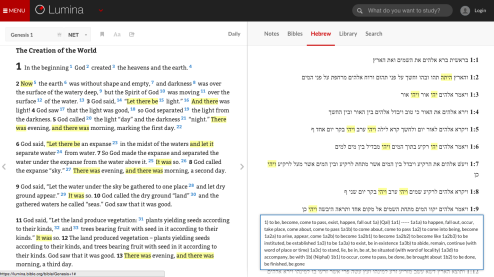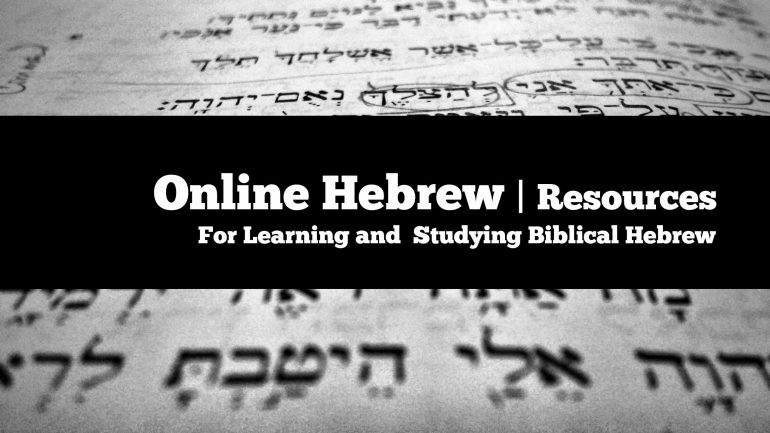Some of you have asked about resources for learning, studying, and reading Biblical Hebrew. I’m sorry that it has taken so long to respond. In the next series of posts, I will list some beginning texts that I think are both essential and helpful. Please note: these are the hard-copy versions of these works. Many of them you can also purchase using Bible study software like Accordance or Logos, and sometimes the larger works cost less in these digital formats than in hard copies. While I introduce them here, I will discuss biblical studies software more fully in later posts.
Biblia Hebraica Stuttgartensia (BHS)
The first resource I would recommend is the paperback version of the Biblia Hebraica Stuttgartensia. Compared to other versions, this one is light weight and affordable. This is the base text for all modern mainstream English translations (this is the text the translating teams begin with). It is based on the Leningrad Codex, which is the oldest complete copy of the Hebrew scriptures (hand-written and dating to around 1000 AD).
This classic scholarly version of the BHS has detailed footnotes which provide information regarding the notes given by the Masoretes in the codex itself, and variations found in other Hebrew manuscripts such as the Dead Sea Scrolls and ancient translations such as the Greek Septuagint texts.
This resource is truly an essential for anyone serious about the study of the Hebrew Bible.
Reader’s Versions
My second recommendation is for general reading of the Hebrew scriptures rather than study. While the BHS is essential for “digging into the text” from a study perspective, sometimes (perhaps even most often) you will just want to read the Bible for pleasure or devotion. This can be challenging for both new and experienced readers of Hebrew, due to the reality that there are many Hebrew words that only occur a few times or even once (hapax legomenon). Even for experienced readers, it is difficult to remember all of these rare terms. Reader’s Versions help with this by noting in the text and listing on the bottom of the page words that occur rarely, and they often provide brief definitions of those words. Once you’ve built up a pretty good vocabulary, this allows you to enjoy reading without having to stop and reach for a dictionary.
There are two Reader’s Versions of the Hebrew Bible that I am aware. One is the Biblia Hebraica Stuttgartensia: A Reader’s Edition, and the other is A Reader’s Hebrew Bible. The Biblia Hebraica Stuttgartensia: A Reader’s Edition provides helps for words that appear 70 times or less, and A Reader’s Hebrew Bible does so for words that appear 100 times or less. Both are based on the Leningrad Codex (the Reader’s Hebrew Bible is based on the Westminster Leningrad Codex project). Of the two I prefer the latter. I have found that I like its layout better, and the definitions are provided in a more clear format (and without a great need to frequently turn to the index). Honestly, this is the Bible that I read for pleasure and general reading. (Notably, you can also get it in a complete Bible, that includes the Hebrew scriptures as well the New Testament in Greek).
Digital Versions: Paid
While I will deal with digital resources in another post, you can also find digital versions of the Hebrew scriptures via Accordance, Olive Tree Bible, and Logos. All of these work on Macs or PCs, as well as mobile devices. Typically, you get the base software and then add packages of the texts you want. I have used both Accordance and Olive Tree the most, and have used Logos the least. They are all good, but my preference for original language studies is hands down Accordance. It’s fast, simple, and was created for textual studies rather than as a devotional or preaching aid.
Digital Versions: Free
You can also access the Westminster Leningrad Codex via many free online Bible sites such as BibleGateway.com, YouVersion, and Lumina at Bible.Org (English will be the base text, but you can open Hebrew in the right pane). Creating accounts on these sites will allow you to create highlights, notes, and even do some in depth word studies and use of parallel texts. Of these, I have found Lumina to be the best in regards to free study applications. However, I have also frequently used YouVersion for daily reading.

Lumina Screen Capture

